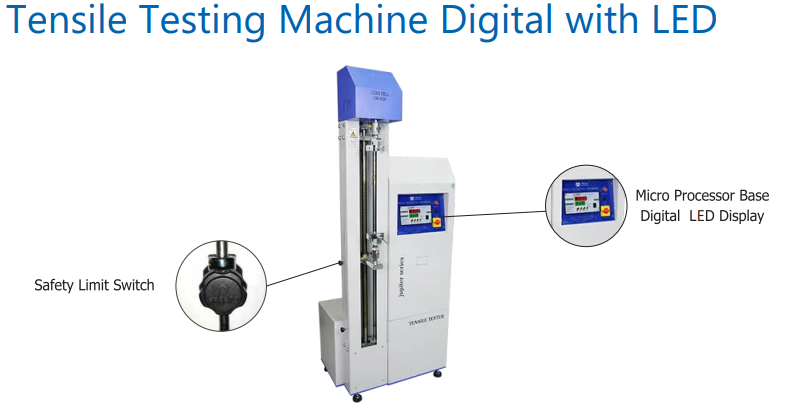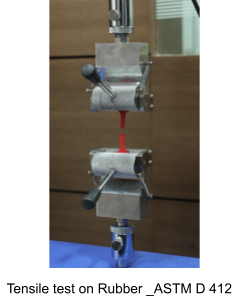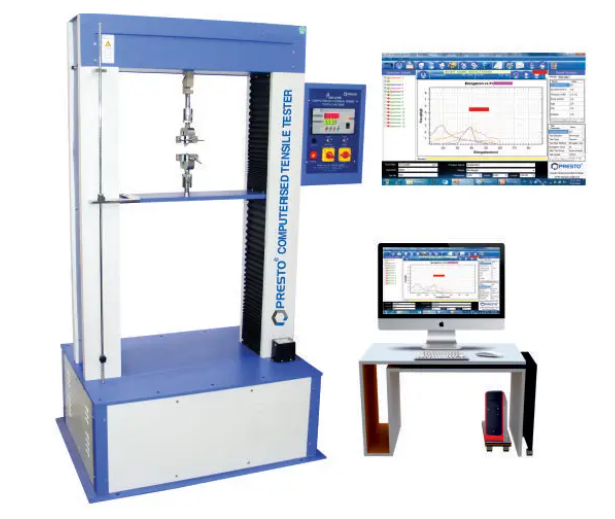

Vishal Malhotra-Testing Instrument Expert
28-4-2025
We live on a world constructed, literally, on material strength. From steel beams supporting skyscrapers, to your phone's plastic case, your clothing's fabric, and electric cable transmitting electricity – knowing how much pressure can be applied before the material deforms or shatters is important. This essential quality is Tensile Strength, or Break Strength at other times.

But how do you measure it? How do we know a material is safe to use and holds up to specifications? That's where the underrated hero of test equipment, the Tensile Testing Machine, enters. Welcome to this blogging journey into the realm of tensile testing, an examination of the machines, the process, and why in an industry our numbers, they are numerous.
Technically, Tensile Strength refers to a measure of a material's resistance to being ripped apart. Attempt to stretch a rubber band. It stretches under the influence of the tension force. Pull some more and eventually it will tear. The maximum force rubber band will exert before rupturing relates to its tensile strength.

Knowledge of this property is important for:
Safety: Preparing materials employed in high-consequence applications (e.g., bridges, automotive components, implants) to avoid failure under intended load.
Quality Control: Reassuring raw materials and end products possess desirable strength characteristics.
Material Selection: Assisting engineers in selecting appropriate material of specified strength for an application.
Research & Development: Investigating contrasts of new material properties or effects of processing on strength.
Case Study: Assuring Structural Stability with a Tensile Strength Tester for Steel
Problem: Big construction company "Build Strong Corp" was contracted to construct a multi-story office building. They bought structural steel beams from a new supplier who had competitive prices. Preliminary site work revealed quality control engineers seeing irregularly installed beams and questioning whether they could achieve strict safety codes. Random failure would be disastrous.

Solution: Build Strong Corp invested in a strong Tensile strength tester for steel and put into practice a stringent incoming material verification process. Representative samples were machined into standard test specimens before receiving any batch of steel beams for use. The specimens were subjected to aggressive tensile tests according to ASTM A370 standards.
The Tensile testing machine employed high accuracy to gauge the yield strength, ultimate tensile strength, and elongation of all samples. The Tensile testing machine idea enabled them to impose controlled force and provide accurate stress-strain curves to examine in depth.
Outcome: The test quickly identified certain batches from the new supplier with low yield and tensile strengths less than the minimum required specifications. While these beams appeared to be the same on the surface, their internal weakness was exposed through the tensile test. Build strong Corp. disqualified the faulty batches so that possibly hazardous materials were not included in the structure. They collaborated with the supplier to rectify the quality problem using the test results as objective evidence. Implementation of this Tensile testing procedure by their professional Tensile strength tester for steel greatly improved their quality control, guaranteed conformity to safety standards, safeguarded their reputation, and ultimately guaranteed the building's structural integrity. This earned them Expertise and acquired Trustworthiness from clients and authorities.
The choice of the right Material Strength Tester is based on materials you are testing (metals, plastics, textiles, rubber, etc.), the force range, and the data you need. Load capacity, speed control, grip types, and software features are all factors to consider.
The Tensile Strength Tester is more than just machinery; it's a guardian of quality, safety, and progress. Delivering precise data regarding the ultimate Tensile Strength / Break Strength of a material allows engineers, manufacturers, and scientists to make decisions based on science, not guesswork. From steel giants to spiders' silk threads, knowing what occurs under tension is all critical. Conducting a sound tensile test program with good equipment is not only good practice – it's essential to creating a safer, more reliable world.
Have you used tensile testing? Let us hear in the comments below. Share this article if you enjoyed it on social media.
Need to make sure your materials cut the mustard? Have a look at our selection of Tensile Strength Testers or get in touch with us today to talk about your individual testing requirements!
Q1. What is tensile strength tester used for?
A1. A Universal Testing Machine or a tensile strength tester applies a force to a material to find its pull resistance. Its main purpose is to find important mechanical properties such as ultimate tensile strength (fracture stress), yield strength (cause of permanent deformation), elongation 1 (ductility), and modulus of elasticity (stiffness). All these values are important in quality control, material purchasing, safety testing, and R&D in most industries.
Q2. How is tensile strength tested?
A2. Tensile strength is measured by placing a standard specimen of the material, firmly into the jaws of a tensile tester machine, and pulling the specimen with a controlled force at a constant speed until the specimen ruptures. The machine measures the force applied and the sample extension during the test. All such information is preferably plotted in the form of a stress-strain curve from which tensile strength and other measurements are obtained. This is termed a tensile test.
Q3. What instrument is used to determine tensile strength?
A3. The usual machine used to test tensile strength is a Tensile Strength Tester, or else by other names more broadly described as Universal Testing Machine (UTM), Tension Meter, or Pull Tester. They possess grips to hold the test piece, a drive system upon which the load is imposed, a device to measure the force (load cell) to ascertain the load, and an extensometer (or equivalent system) to find the elongation.
Q4. For what applications is tensile strength used?
A4. Tensile strength information is applied to many important applications:
Engineering Design: In order to select appropriate materials that can withstand expected loads in structures like building, aerospace, automobile, etc.
Quality Control: To guarantee products and materials to requirement and standards.
Safety Assurance: To ensure components will not fail when stressed, preventing accidents and providing reliability.
Material Comparison: For comparing the properties of two or more distinct materials or to observe the effects of treatment by processing.
R & D: To discover new materials and understand their mechanical properties.
Get accurate and reliable testing solutions tailored to your needs.
Find the perfect solution at the right Tensile Testing Machine Price today!
Related Blogs

Test the bond strength of your materials with a peel strength tester. Perfect for quality assurance in packaging and manufacturing industries. Explore models and specifications now.

The Vacuum Leak Tester serves as a quality control instrument which uses vacuum pressure to detect package leaks on test specimens.

Explore how a humidity chamber operates with insights into its working principle, detailed diagram, and practical applications across industries like packaging, electronics, and pharmaceuticals.